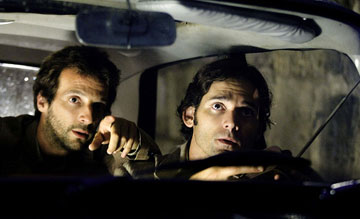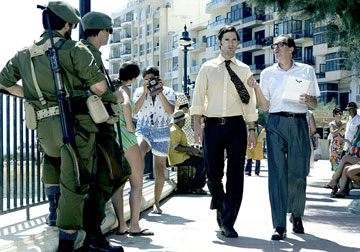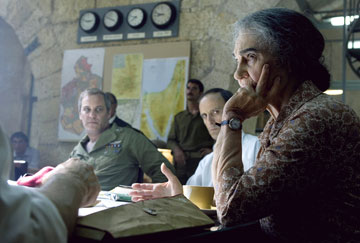Munich
Directed by Steven Spielberg
 Munich is a very ambitious project. The story, based on a controversial book (Vengeance: The True Story of an Israeli Counter-Terrorist Team by George Jonas) concerns an Israeli hit team sent out after eleven Palestinians thought to be behind the massacre of eleven Israeli athletes at the 1972 Olympics at Munich. It’s both a nail-biting thriller and a thought-provoking piece on the effect of the operation on the members of the squad. The book is controversial because, while it’s presented as non-fiction and based on the memoirs of a real-life Israeli Mossad agent, critics have dismissed it as riddled with errors and claimed that the supposed agent (Juval Aviv, on whom the Avner character is based – played by Eric Bana) never worked for the Mossad and never participated in the hunt for the Munich terrorists. So there are serious doubts about how realistic the film is. Director Steven Spielberg called the movie “historical fiction.” Munich is a very ambitious project. The story, based on a controversial book (Vengeance: The True Story of an Israeli Counter-Terrorist Team by George Jonas) concerns an Israeli hit team sent out after eleven Palestinians thought to be behind the massacre of eleven Israeli athletes at the 1972 Olympics at Munich. It’s both a nail-biting thriller and a thought-provoking piece on the effect of the operation on the members of the squad. The book is controversial because, while it’s presented as non-fiction and based on the memoirs of a real-life Israeli Mossad agent, critics have dismissed it as riddled with errors and claimed that the supposed agent (Juval Aviv, on whom the Avner character is based – played by Eric Bana) never worked for the Mossad and never participated in the hunt for the Munich terrorists. So there are serious doubts about how realistic the film is. Director Steven Spielberg called the movie “historical fiction.”
 It certainly comes across as very realistic. From the production design, costuming and down to the choreography of the “hits” themselves, nothing about the look of the film suggests contrivance – Spielberg avoided the flamboyance of his recent War of the Worlds – he kept things small, gritty and believable. His operatives, though highly trained and resourceful, make mistakes and have to scramble to fix things. These elite operatives impressed me as believable humans – this is no Mission Impossible. I can’t recall one scene that made me roll my eyes – everything is on a real-life, human level. It certainly comes across as very realistic. From the production design, costuming and down to the choreography of the “hits” themselves, nothing about the look of the film suggests contrivance – Spielberg avoided the flamboyance of his recent War of the Worlds – he kept things small, gritty and believable. His operatives, though highly trained and resourceful, make mistakes and have to scramble to fix things. These elite operatives impressed me as believable humans – this is no Mission Impossible. I can’t recall one scene that made me roll my eyes – everything is on a real-life, human level.
As leader of the hit squad, Avner gets together in Europe with blue-eyed Steve (Daniel Craig), Carl (Ciaran Hinds), bomber Robert (Mathieu Kassovitz) and Hans (Hanns Zischler) – most of them non-Israeli, for cover. In one sense, Munich is a conventional thriller: the crew consists of a motley variety of characters – that helps to set up interesting conversations and little rivalries within the team, adding a genre-typical human interest angle. Their no-nonsense Israeli handler (a chilling Geoffrey Rush) brought home, in every one of his scenes, the gravity of the situation and how determined the Israeli government was to see the operation through.
 My favorite scenes involve Avner’s contacts with a shady French intelligence source, Louis (beautifully played cool and urbane by Mathieu Amalric) – an international operative dealing in information: where to find the Palestinians behind the 1972 Olympic attacks. If that character wasn’t cool enough, we then get to meet his father – it’s a family business – played by Michael Lonsdale. I’m never sure whether or not to trust these guys, but they’re a couple of the most interesting spy-film characters in memory My favorite scenes involve Avner’s contacts with a shady French intelligence source, Louis (beautifully played cool and urbane by Mathieu Amalric) – an international operative dealing in information: where to find the Palestinians behind the 1972 Olympic attacks. If that character wasn’t cool enough, we then get to meet his father – it’s a family business – played by Michael Lonsdale. I’m never sure whether or not to trust these guys, but they’re a couple of the most interesting spy-film characters in memory
One aspect which I found difficult to believe: that Avner, as the team leader, would have doubts about his mission in the sense that he would doubt the guilt of his targets. I can’t help but think that the Israelis would thoroughly screen their operatives for such a mission. Having a leader with such doubts during the mission could not only compromise the mission but could also endanger the other team members. These doubts themselves may be realistic – maybe their intelligence was faulty and they did target the wrong guys – but I can’t believe that the field operatives (Avner and team) could afford to start thinking that way in the middle of the mission. This is the point of view of the film – clearly – and it’s the only thing in the film that struck me as unrealistic.
 Much more convincing was Avner’s stress after completing these missions. It’s difficult for a grounded, moral man to go after targets such as these in civilian settings. In one case the target is a family man, living in Paris with his wife and daughter. The filmmakers paint the targets as nice, Westernized, educated Arabs – not mouth-breathing crazies – these are the puppet masters, not the suicide bombers. I found those depictions realistic. Why wouldn’t they blend in? But that makes it that much harder for Avner to accept what he’s done. This is complicated by his long separation from his wife and newborn daughter. He’s under tremendous stress and how he deals with it is the crux of the film. Much more convincing was Avner’s stress after completing these missions. It’s difficult for a grounded, moral man to go after targets such as these in civilian settings. In one case the target is a family man, living in Paris with his wife and daughter. The filmmakers paint the targets as nice, Westernized, educated Arabs – not mouth-breathing crazies – these are the puppet masters, not the suicide bombers. I found those depictions realistic. Why wouldn’t they blend in? But that makes it that much harder for Avner to accept what he’s done. This is complicated by his long separation from his wife and newborn daughter. He’s under tremendous stress and how he deals with it is the crux of the film.
Munich offers us a rare combination of spy-movie action – no wham-o shortage here – and a complex story of a good man under incredible stress. While some of the exterior photography is very impressive, it’s not a film that depends on stunning visuals – content is king – so if you wait and see it on DVD, you’ll get almost all of its considerable punch.
Images are copyright Universal Pictures.
For more information about this film including detailed cast and crew credits, check out The Internet Movie Database by clicking here.
e-mail me
|

